剑桥雅思9口语真题+解析Test3-Part3
剑桥雅思真题解析阅读9(test3)
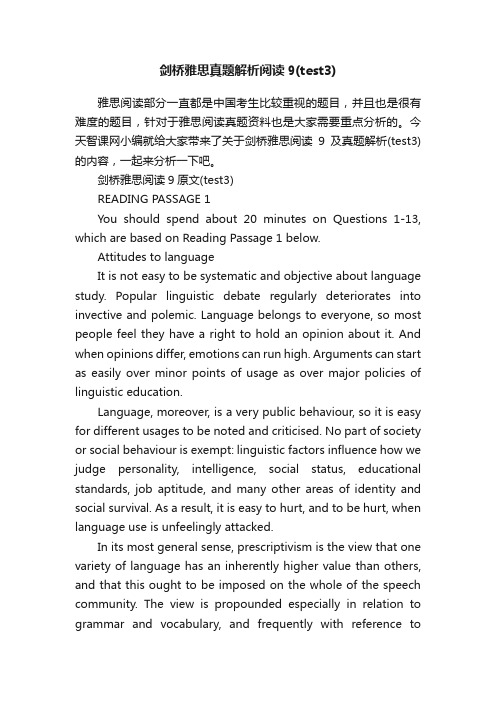
剑桥雅思真题解析阅读9(test3)雅思阅读部分一直都是中国考生比较重视的题目,并且也是很有难度的题目,针对于雅思阅读真题资料也是大家需要重点分析的。
今天智课网小编就给大家带来了关于剑桥雅思阅读9及真题解析(test3)的内容,一起来分析一下吧。
剑桥雅思阅读9原文(test3)READING PASSAGE 1You should spend about 20 minutes on Questions 1-13, which are based on Reading Passage 1 below.Attitudes to languageIt is not easy to be systematic and objective about language study. Popular linguistic debate regularly deteriorates into invective and polemic. Language belongs to everyone, so most people feel they have a right to hold an opinion about it. And when opinions differ, emotions can run high. Arguments can start as easily over minor points of usage as over major policies of linguistic education.Language, moreover, is a very public behaviour, so it is easy for different usages to be noted and criticised. No part of society or social behaviour is exempt: linguistic factors influence how we judge personality, intelligence, social status, educational standards, job aptitude, and many other areas of identity and social survival. As a result, it is easy to hurt, and to be hurt, when language use is unfeelingly attacked.In its most general sense, prescriptivism is the view that one variety of language has an inherently higher value than others, and that this ought to be imposed on the whole of the speech community. The view is propounded especially in relation to grammar and vocabulary, and frequently with reference topronunciation. The variety which is favoured, in this account, is usually a version of the ‘standard’ written language, especially as encountered in literature, or in the formal spoken language which most closely reflects this style. Adherents to this variety are said to speak or write ‘correctly’; deviations fr om it are said to be ‘incorrect’.All the main languages have been studied prescriptively, especially in the 18th century approach to the writing of grammars and dictionaries. The aims of these early grammarians were threefold: (a) they wanted to codify the principles of their languages, to show that there was a system beneath the apparent chaos of usage, (b) they wanted a means of settling disputes over usage, and (c) they wanted to point out what they felt to be common errors, in order to ‘improve’ the la nguage. The authoritarian nature of the approach is best characterized by its reliance on ‘rules’ of grammar. Some usages are ‘prescribed’, to be learnt and followed accurately; others are ‘proscribed’, to be avoided. In this early period, there were no half-measures: usage was either right or wrong, and it was the task of the grammarian not simply to record alternatives, but to pronounce judgement upon them.These attitudes are still with us, and they motivate a widespread concern that linguistic standards should be maintained. Nevertheless, there is an alternative point of view that is concerned less with standards than with the facts of linguistic usage. This approach is summarized in the statement that it is the task of the grammarian to describe, not prescribe —to record the facts of linguistic diversity, and not to attempt the impossible tasks of evaluating language variation or halting language change. In the second half of the 18th century, wealready find advocates of this view, such as Joseph Priestley, whose Rudiments of English Grammar (1761) insists that ‘the custom of speaking is the original and only just standard of any language’. Linguistic issue, it is argued, cannot be solved by logic and legislation. And this view has become the tenet of the modern linguistic approach to grammatical analysis.In our own time, the opposition between ‘descriptivists’ and ‘prescriptivists’ has often become extreme, with both sides painting unreal pictures of the other. Descriptive grammarians have been presented as people who do not care about standards, because of the way they see all forms of usage as equally valid. Prescriptive grammarians have been presented as blind adherents to a historical tradition. The opposition has even been presented in quasi-political terms —of radical liberalism vs elitist conservatism.Questions 1-8Do the following statements agree with the claims of the writer in Reading Passage 1?In boxes 1-8 on your answer sheet, writeYES if the statement agrees with the claims of the writerNO if the statement contradicts the claims of the writerNOT GIVEN if it is impossible to say what the writer thinks about this1 There are understandable reasons why arguments occur about language.2 People feel more strongly about language education than about small differences in language usage.3 Our assessment of a person’s intelligence is affected by the way he or she uses language.4 Prescriptive grammar books cost a lot of money to buy inthe 18th century.5 Prescriptivism still exists today.6 According to descriptivists it is pointless to try to stop language change.7 Descriptivism only appeared after the 18th century.8 Both descriptivists and prescriptivists have been misrepresented.Questions 9-12Complete the summary using the list of words, A-I, below.Write the correct letter, A-I, in boxes 9-12 on your answer sheet.The language debateAccording to 9______, there is only one correct form of language. Linguists who take this approach to language place great importance on grammatical 10 ______.Conversely, the view of 11 ______, such as Joseph Priestly, is that grammar should be based on 12 ______.A descriptivistsB language expertsC popular speechD formal languageE evaluationF rulesG modern linguists H prescriptivists I changeQuestion 13Choose the correct letter, A, B, C or D.Write the correct letter in box 13 on your answer sheet.What is the writer’s purpose in Reading Passage 1?A. to argue in favour of a particular approach to writing dictionaries and grammar booksB. to present a historical account of differing views of languageC. to describe the differences between spoken and written languageD. to show how a certain view of language has been discreditedREADING PASSAGE 2You should spend about 20 minutes on Questions 14-26, which are based on Reading Passage 2 below.Tidal PowerUndersea turbines which produce electricity from the tides are set to become an important source of renewable energy for Britain. It is still too early to predict the extent of the impact they may have, but all the signs are that they will play a significant role in the futureA. Operating on the same principle as wind turbines, the power in sea turbines comes from tidal currents which turn blades similar to ships’ propellers, but, unlike wind, the tid es are predictable and the power input is constant. The technology raises the prospect of Britain becoming self-sufficient in renewable energy and drastically reducing its carbon dioxide emissions. If tide, wind and wave power are all developed, Britain would be able to close gas, coal and nuclear power plants and export renewable power to other parts of Europe. Unlike wind power, which Britain originally developed and then abandoned for 20 years allowing the Dutch to make it a major industry, undersea turbines could become a big export earner to island nations such as Japan and New Zealand.B. Tidal sites have already been identified that will produce one sixth or more of the UK’s power —and at prices competitive with modern gas turbines and undercutting those of the already ailing nuclear industry. One site alone, the Pentland Firth, between Orkney and mainland Scotland, could produce 10% of the country’s electricity with banks of turbines under the sea,and another at Alderney in the Channel Islands three times the 1,200 megawatts of Britain’s largest and newest nuclear plant, Sizewell B, in Suffolk. Other sites identified include the Bristol Channel and the west coast of Scotland, particularly the channel between Campbeltown and Northern Ireland.C. Work on designs for the new turbine blades and sites are well advanced at the University of Southampton’s sustainable energy research group. The first station is expected to be installed off Lynmouth in Devon shortly to test the technology in a venture jointly funded by the department of Trade and Industry and the European Union. AbuBakr Bahaj, in charge of the Southampton research, said: ‘The prospects for energy from tidal currents are far better than from wind because the flows of water are predictable and constant. The technology for dealing with the hostile saline environment under the sea has been developed in the North Sea oil industry and much is already known about turbine blade design, because of wind power and ship propellers. There are a few technical difficulties, but I believe in the next five to ten years we will be installing commercial marine turbine farms.’ Southampton has been awarded £215,000 over three years to develop the turbines and is working with Marine Current Turbines, a subsidiary of IT power, on the Lynmouth project. EU research has now identified 106 potential sites for tidal power, 80% round the coasts of Britain. The best sites are between islands or around heavily indented coasts where there are strong tidal currents.D. A marine turbine blade needs to be only one third of the size of wind generator to produce three times as much power. The blades will be about 20 metres in diameter, so around 30 metres of water is required. Unlike wind power, there are unlikelyto be environmental objections. Fish and other creatures are thought unlikely to be at risk from the relatively slow-turning blades. Each turbine will be mounted on a tower which will connect to the national power supply grid via underwater cables. The towers will stick out of the water and be lit, to warn shipping, and also be designed to be lifted out of the water for maintenance and to clean seaweed from the blades.E. Dr Bahaj has done most work on the Alderney site, where there are powerful currents. The single undersea turbine farm would produce far more power than needed for the Channel Islands and most would be fed into the French Grid and be re-imported into Britain via the cable under the Channel.F. One technical difficulty is cavitation, where low pressure behind a turning blade causes air bubbles. These can cause vibration and damage the blades of the turbines. Dr Bahaj said: ‘We have to test a number of blade types to avoid this happening or at least make sure it does not damage the turbines or reduce performance. Another slight concern is submerged debris floating into the blades. So far we do not know how much of a problem it might be. We will have to make the turbines robust because the sea is a hostile environment, but all the signs that we can do it are good.’Questions 14-17Reading Passage 2 has six paragraphs, A-F.Which paragraph contains the following information?Write the correct letter, A-F, in boxes 14-17 on your answer sheet.NB You may use any letter more than once.14 the location of the first test site15 a way of bringing the power produced on one site backinto Britain16 a reference to a previous attempt by Britain to find an alternative source of energy17 mention of the possibility of applying technology from another industryQuestions 18-22Choose FIVE letters, A-J.Write the correct letters in boxes 18-22 on your answer sheet.Which FIVE of the following claims about tidal power are made by the writer?A It is a more reliable source of energy than wind power.B It would replace all other forms of energy in Britain.C Its introduction has come as a result of public pressure.D It would cut down on air pollution.E It could contribute to the closure of many existing power stations in Britain.F It could be a means of increasing national income.G It could face a lot of resistance from other fuel industries.H It could be sold more cheaply than any other type of fuel.I It could compensate for the shortage of inland sites for energy production.J It is best produced in the vicinity of coastlines with particular features.Questions 23-26Label the diagram below.Choose NO MORE THAN TWO WORDS from the passage for each answer.Write your answers in boxes 23-26 on your answer sheet.An Undersea TurbineREADING PASSAGE 3You should spend about 20 minutes on Questions 27-40, which are based on Reading Passage 3 below.Information theory-the big ideaInformation theory lies at the heart of everything —from DVD players and the genetic code of DNA to the physics of the universe at its most fundamental. It has been central to the development of the science of communication, which enables data to be sent electronically and has therefore had a major impact on our livesA. In April 2002 an event took place which demonstrated one of the many applications of information theory. The space probe, Voyager I, launched in 1997, had sent back spectacular images of Jupiter and Saturn and then soared out of the Solar System on a one-way mission to the stars. After 25 years of exposure to the freezing temperatures of deep space, the probe was beginning to show its age. Sensors and circuits were on the brink of failing and NASA experts realized that they had to do something or lose contact with their probe forever. The solution was to get a message to Voyager I to instruct it to use spares to change the failing parts. With the probe 12 billion kilometers from Earth, this was not an easy task. By means of a radio dish belonging to NASA’s Deep Space Network, the message was sent out into the depths of space. Even travelling at the speed of light, it took over 11 hours to reach its target, far beyond the orbit of Pluto. Yet, incredibly, the little probe managed to hear the faint call from its home planet, and successfully made the switchover.B. It was the longest-distance repair job in history, and a triumph for the NASA engineers. But it also highlighted the astonishing power of the techniques developed by American communications engineer Claude Shannon, who had died just ayear earlier. Born in 1916 in Petoskey, Michigan, Shannon showed an early talent for maths and for building gadgets, and made breakthroughs in the foundations of computer technology when still a student. While at Bell Laboratories, Shannon developed information theory, but shunned the resulting acclaim. In the 1940s, he single-handedly created an entire science of communication which has since inveigled its way into a host of applications, from DVDs to satellite communications to bar codes — any area, in short, where data has to be conveyed rapidly yet accurately.C. This all seems light years away from the down-to-earth uses Shannon originally had for his work, which began when he was a 22-year-old graduate engineering student at the prestigious Massachusetts Institute of Technology in 1939. He set out with an apparently simple aim: to pin down the precise meaning of the concept of ‘information’. The most basic form of information, Shannon argued, is whether something is true or false —which can be captured in the binary unit, or ‘bit’, of the form 1 or 0. Having identified this fundamental unit, Shannon set about defining otherwise vague ideas about information and how to transmit it from place to place. In the process he discovered something surprising: it is always possible to guarantee information will get through random interference —‘noise’ — intact.D. Noise usually means unwanted sounds which interfere with genuine information. Information theory generalses this idea via theorems that capture the effects of noise with mathematical precision. In particular, Shannon showed that noise sets a limit on the rate at which information can pass along communication channels while remaining error-free. This ratedepends on the relative strengths of the signal and noise travelling down the communication channel, and on its capacity (its ‘bandwidth’). The resulting limit, given in units of bits per second, is the absolute maximum rate of error-free communication given singal strength and noise leve. The trick, Shannon showed, is to find ways of packaging up —‘coding’ — information to cope with the ravages of noise, while staying within the information-carrying capacity —‘bandwidth’ — of the communication system being used.E. Over the years scientists have devised many such coding methods, and they have proved crucial in many technological feats. The Voyager spacecraft transmitted data using codes which added one extra bit for every single bit of information; the result was an error rate of just one bit in 10,000 — and stunningly clear pictures of the planets. Other codes have become part of everyday life — such as the Universal Product Code, or bar code, which uses a simple error-detecting system that ensures supermarket check-out lasers can read the price even on, say, a crumpled bag of crisps. As recently as 1993, engineers made a major breakthrough by discovering so-called turbo codes —which come very close to Shannon’s ultimate limit for the maximum rate that data can be transmitted reliably, and now play a key role in the mobile videophone revolution.F. Shannon also laid the foundations of more efficient ways of storing information, by stripping out superfluous (‘redundant’) bits from data which contributed little real information. As mobile phone text messages like ‘I CN C U’ show, it is often possible to leave out a lot of data without losing much meaning. As with error correction, however, there’s a limit beyond which messages become too ambiguous. Shannonshowed how to calculate this limit, opening the way to the design of compression methods that cram maximum information into the minimum space.Questions 27-32Reading Passage 3 has six paragraphs, A-F.Which paragraph contains the following information?Write the correct letter, A-F, in boxes 27-32 on your answer sheet.27 an explanation of the factors affecting the transmission of information28 an example of how unnecessary information can be omitted29 a reference to Shannon’s attitude to fame30 details of a machine capable of interpreting incomplete information31 a detailed account of an incident involving information theory32 a reference to what Shannon initially intended to achieve in his researchQuestions 33-37Complete the notes below.Choose NO MORE THAN TWO WORDS form the passage for each answer.Write your answers in boxes 33-37 on your answer sheet.The Voyager 1 Space ProbeThe probe transmitted pictures of both 33______ and ______, then left the 34 ______.The freezing temperatures were found to have a negative effect on parts of the space probe.Scientists feared that both the 35 ______ and ______ wereabout to stop working.The only hope was to tell the probe to replace them with 36 ______ —but distance made communication with the probe difficult.A 37 ______ was used to transmit the message at the speed of light.The message was picked up by the probe and the switchover took place.Questions 38-40Do the following statements agree with the information given in Reading Passge 3?In boxes 38-40 on your answer sheet, writeTRUE if the statement agrees with the informationFALSE if the statement contradicts the informationNOT GIVEN if there is no information on this38 The concept of describing something as true or false was the starting point for Shannon in his attempts to send messages over distances.39 The amount of information that can be sent in a given time period is determined with reference to the signal strength and noise level.40 Products have now been developed which can convey more information than Shannon had anticipated as possible.剑桥雅思阅读9原文参考译文(test3)PASSAGE 1 参考译文:对语言的态度对于语言进行系统、客观的研究并不容易。
剑桥雅思9真题及解析Test3写作
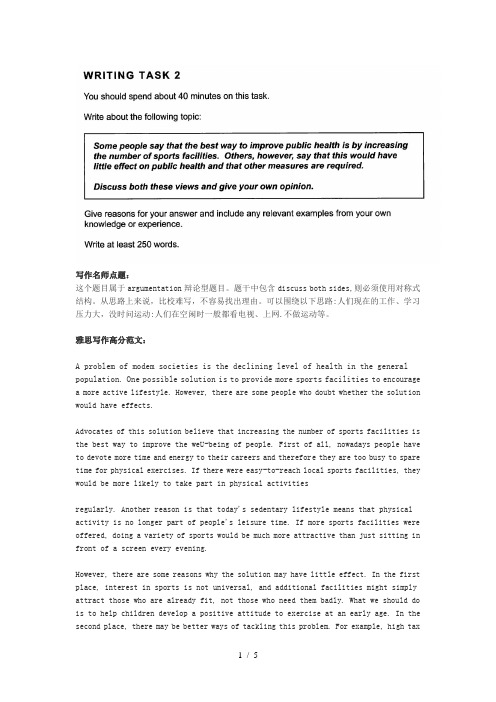
写作名师点题:这个题目属于argumentation辩论型题目。
题干中包含discuss both sides,则必须使用对称式结构。
从思路上来说,比校难写,不容易找出理由。
可以围绕以下思路:人们现在的工作、学习压力大,没时问运动:人们在空闲时一般都看电视、上网.不做运动等。
雅思写作高分范文:A problem of modem societies is the declining level of health in the general population. One possible solution is to provide more sports facilities to encourage a more active lifestyle. However, there are some people who doubt whether the solution would have effects.Advocates of this solution believe that increasing the number of sports facilities is the best way to improve the weU-being of people. First of all, nowadays people have to devote more time and energy to their careers and therefore they are too busy to spare time for physical exercises. If there were easy-to-reach local sports facilities, they would be more likely to take part in physical activitiesregularly. Another reason is that today's sedentary lifestyle means that physical activity is no longer part of people's leisure time. If more sports facilities were offered, doing a variety of sports would be much more attractive than just sitting in front of a screen every evening.However, there are some reasons why the solution may have little effect. In the first place, interest in sports is not universal, and additional facilities might simply attract those who are already fit, not those who need them badly. What we should do is to help children develop a positive attitude to exercise at an early age. In the second place, there may be better ways of tackling this problem. For example, high tax写作名师点题:在统计数据类图表作文中.较少出现四幅图的考查形式.本题是四幅饼图.而 2013年2月2日的考试中给出的是四幅柱状图,剑7Test 4也是四幅饼图。
剑桥雅思9 口语 Test3 参考答案

答案编辑者:上海环球雅思口语名师:李宁(英国剑桥国际考试委员会IGCSE & A Level口语考官)微博:环球雅思李宁Part 1The examiner asks the candidates about him/herself, his/her home, work or studies and other familiar topics.EXAMPLETelephoningHow often do you make telephone calls?[ why/ why not?]Although I generally send emails and text messages, I still make telephone calls on a daily basis. I regularly need to call my colleagues, especially if its urgent or complicated, so its more convenient than sending text messages. However, I also make social phone calls to my friends and family, just to chat and see how their day has been!Who do you spend most time talking to on the telephone?[why]It changes, day to day. I probably make most phone calls to my colleague, Maria, especially as we are also friends outside of work. Sometimes I will call her to ask her a question about work, but I will also call her if I am going shopping to see if she wants anythings from the shops, to see if she wants to come over dinner, or would like to go for a bike ride! I always call my parents twice a week, on Wednesday and Saturday evenings. If I don't call then they will get worried!When do you think you’ll next make a phone call?[why?]I will call my American friend, Jesse, as soon as I finish work to ask him if I can borrow his big cooking pot. I have invited some friends to dinner at my apartment tomorrow evening, and I am planning to cook a big stew, so I will need to borrow his pot.Do you sometimes prefer to send a text message instead of telephoning? [why/ why not?]Yes certainly. I think sending text messages is often more convenient. For example, if I am on a bus or train where its too noisy, or if I am eating in a restaurant where I do not want to annoy other diners, then I will always send a text message. People often send me a text message, because they know I am teaching during the daytime and I cannot answer my phone. So instead, they send me a text message and I will reply as soon as I am free.Part 2Describe a journey [e.g. By car, plane, boat] that you remember well.You should say:Where you wentHow you traveledWhy you went on the journeyand explain why you remember this journey wellYou will have to talk about this topic for one to two minutes.You have one minute to think about what you are going to say.You can make some notes to help you if you wish.In the summer of 2010, I cycled coast-to-coast across the United States of America with two of my best friends from University.The three of us met at university in Liverpool, and we shared an interest in cycling. We regularly went on biking and camping trips into the Lake District at weekends if we had free time. During our final year, we decided it would be a great idea to train up and attempt to cycle across the North American continent to raise money for charity.So in July 2010, after months of training and preparation, we flew across the Atlantic Ocean to begin the 7,000 km journey across the USA.The journey was far more challenging than we thought it would be. Both our mental and physical limits were put to the test as we cycled across mountains, deserts and rivers, sometimes going days without seeing any other people. We had to carry a lot of heavy equipment on our bikes, and we camped almost every night. If we were passing through a large town then we would stay in a hotel, to get a good night sleep and to have a shower! But more often than not, we would camp in the wild and wash in rivers and waterfalls.Our journey began in Maryland and took us west, through the country's capital city, Washington DC, over the Appalachian mountains and the Mississippi River onto the Kansas plains. From there we continued west over the Rocky Mountains and the deserts of Utah and Nevada. Finally, we crossed the Sierra Nevada mountain range and descended through California to San Francisco.Overall, we cycled 7,000 kilomet ers in 49 days, and raised over £4,000 for a children's cancer charity, which I think is an incredible achievement.PART 3Discussion topics :Reasons for daily travelExample questions :Why do people need to travel every day ?People need to travel for lots of different reasons. Almost everybody has to travel to work, so they can earn money and provide for their family. If a person is lucky, then they will live very close to where they work, so they can travel on foot or by bicycle. Sometimes, however, people live very far away, so they must travel by bus, train, car, or even sometimes by plane or boat!Lots of people also travel to see friends and family, who might live in a different city, or even a different country.But often people just like to travel for fun, to go to somewhere new, or to see a famous tourist site or place of natural beauty.What problems can people have when they are on their daily journey ,for example to work or school ? Why is this ?Naturally, the means and frequency by which people choose to travel is a topic that can be controversial. Pollution is becoming an increasing problem all over the world. Whenever possible, we should choose to travel in a way that does the least amount of damage to the environment. This includes walking, cycling, and using public transport such as buses and trains. Besides, if everyone travels in cars, not only will pollution problems persist, but traffic will become more congested. This will cause people to be late to school and work, and also cost businesses money.Some people say that daily journeys like these will not be so common in the future .Do you agree or disagree ?Why ?I agree that in the future, new methods of travel will exist, such as hovercrafts and small flying machines that will solve traffic problems. Or maybe new methods of energy and fuel will be developed which will not be as damaging to the environment, such as hydrogen power. But until such things are a reality, we must all concentrate on minimising our carbon footprint.Benefits of international travelExample questions :What do you think people can learn from travelling to other countries ? Why ?I have travelled to many countries all over the world, in Europe, Africa, North America and Asia. I think travelling has helped me to become a more interesting, knowledgeable and well-rounded individual with a greater understanding and acceptance for world cultures. Many of my friends from my hometown have never left England, and this shows in their ways of thinking, which is often limited and not as progressive. For example, they dislike responsibility, they can't take theinnitiative, they dislike being out of their comfort zone, and they are uncomfortable taking the lead. Moreover, they do not know as much about other cultures' languages, beliefs, history, food, and drink. Subsequently, they can be ignorant and skeptical of foreigners in their country, which can lead to dislike and racism.Can travel make a positive difference to the economy of a country ?How ?I have been to over 25 countries worldwide. Often, this has been a quick trip or tour of a country, where I would see and do as much as I can in the time frame that I have. But I have also lived in two foreign countries; Uganda, where I lived for 4 months, and China, where I have been for over a year now. In both situations, I feel I have contributed to the economy of the respective countries; when I was travelling I contributed by spending money on gifts, food and accommodation, and when I have been living abroad I have paid taxes and offered my skills to the country in the form of work.Do you think a society can benifit its members have experience of travelling to other countries ?In what ways?Yes, I think travelling to other countires will help the individual become more interesting, knowledgeable, creative and well-rounded with a greater understanding and acceptance for world cultures. If more citizens had these progressive qualities, then naturally this will benefit the society.。
剑桥雅思9真题及解析听力Test3
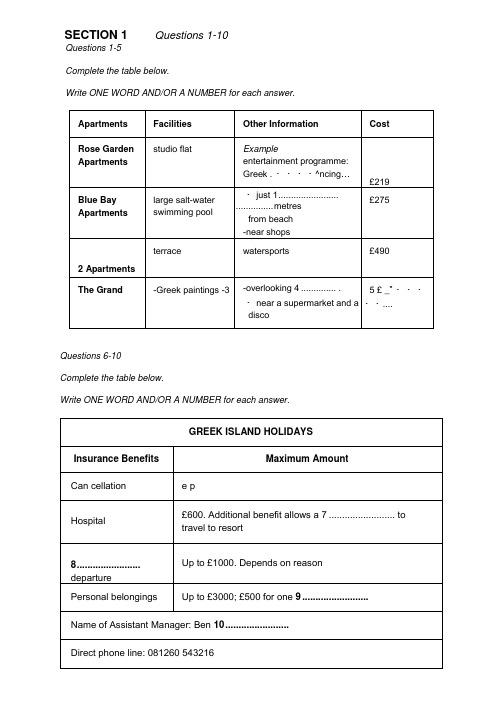
SECTION 1Questions 1-10Questions 1-5Complete the table below.Write ONE WORD AND/OR A NUMBER for each answer.Questions 6-10Complete the table below.Write ONE WORD AND/OR A NUMBER for each answer.雅思听力真题全解析听前预测1-5题是分类信息表格填空题。
考生应快速浏览表格的第一行和第一列,发现同一行是相关信息,同一列是同类信息,可以得知分别要填写的是公寓的名称、设施、相关信息和价格;接着,找出题目顺序,同时预测每个空格的答案词性,划出空格前后的定位词。
6-10题是分类信息表格填空题。
做题方法基本同上,不过,考生还应注意到:根据第一行的标题GREEKSLANDHOLIDAYS^知表格与度假有关;最后两行是附加信息,分别是姓名和电话雅思名师解读剑9听力1. 300 请注意,根据空格后的metres可知空格中应填数词,空格前后的salt-water swimming pool和beach是定位词。
此题直接给出了答案,没有陷讲。
2. Sun shade根据空格所在的这一列的另外几项可知空格中应填名词,且要大写首字母。
根据录音中女士说的there are just two more apartme nts 可知答案即将出现,接下来该女士磕磕巴巴地说sun ...Su nshine ,这其实是暗示考生答案更加接近了,但它同时又是陷阱,让考生以为Sunshine是答案,其实,女士的这句话只是提问,男士回答的the Sun shade Apartme nts 才是答案。
3. balco ny Greek pai ntin gs 是本题的并列成分,它既是定位词,又是定性词,决定空格中要填名词或动名词。
录音中,在Greek paintings 之后有个and,提示考生接下来给出的是其并列成分,即balcony。
剑桥雅思9Test3阅读Passage3答案解析
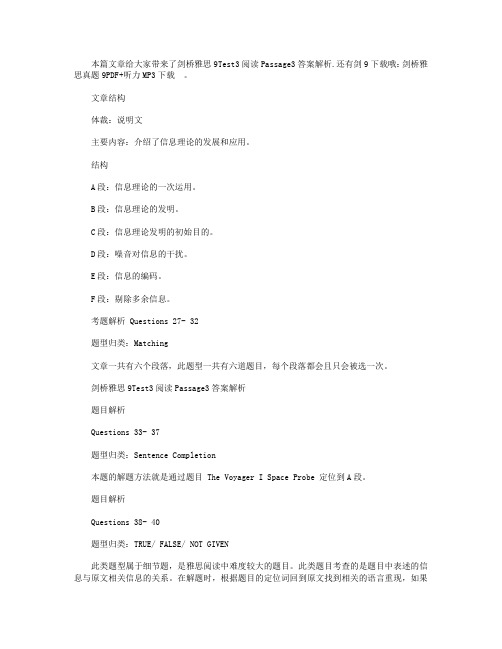
Questions 38- 40
题型归类:TRUE/ FALSE/ NOT GIVEN
此类题型属于细节题,是雅思阅读中难度较大的题目。此类题目考查的是题目中表述的信息与原文相关信息的关系。在解题时,根据题目的定位词回到原文找到相关的语言重现,如果原文与题目表述的信息一致,答案为TRUE ;如果原文与题目表述的信息矛盾,答案为FALSE ;如果从原文信息中不能确定题目所表述的信息,答案为NOTGIVEN。
本篇文章给大家带来了剑桥雅思9Test3阅读Passage3答案解析.还有剑9下载哦:剑桥雅思真题9PDF+听力MP3下载 。
文章结构
体裁:说明文
主要内容:介绍了信息理论的发展和应用。
结构
A段:信息理论的一次运用。
B段:信息理论的发明。
C段:信息理论发明的初始目的。
D段:噪音对信息的干扰。
E段:信息的编码。
题目解析
F段:剔除多余信息。
考题解析 Questions 27- 32
题型归类:Matching
文章一共有六个段落,此题型一共有六道题目,每个段落都会且只会被选一次。
剑桥雅思9Test3阅读Passage3答案解析
题目解析
QueБайду номын сангаасtions 33- 37
题型归类:Sentence Completion
本题的解题方法就是通过题目 The Voyager I Space Probe 定位到A段。
剑桥雅思9阅读解析test3
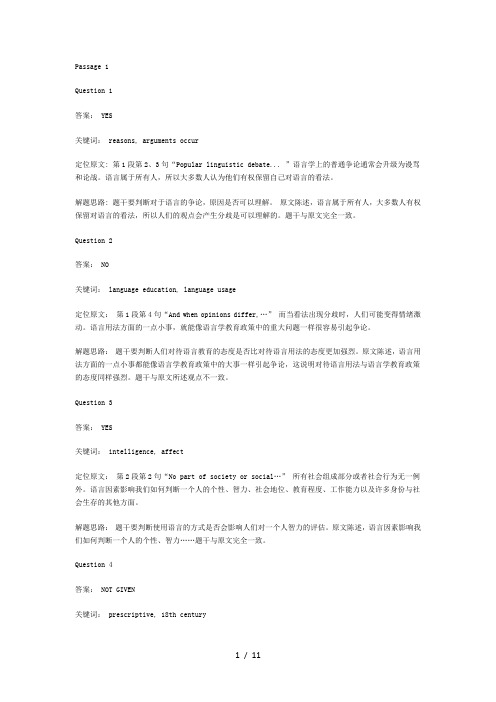
Passage 1Question 1答案: YES关键词: reasons, arguments occur定位原文: 第1段第2、3句“Popular linguistic debate... ”语言学上的普通争论通常会升级为谩骂和论战。
语言属于所有人,所以大多数人认为他们有权保留自己对语言的看法。
解题思路: 题干要判断对于语言的争论,原因是否可以理解。
原文陈述,语言属于所有人,大多数人有权保留对语言的看法,所以人们的观点会产生分歧是可以理解的。
题干与原文完全一致。
Question 2答案: NO关键词: language education, language usage定位原文:第1段第4句“And when opinions differ,…”而当看法出现分歧时,人们可能变得情绪激动。
语言用法方面的一点小事,就能像语言学教育政策中的重大问题一样很容易引起争论。
解题思路:题干要判断人们对待语言教育的态度是否比对待语言用法的态度更加强烈。
原文陈述,语言用法方面的一点小事都能像语言学教育政策中的大事一样引起争论,这说明对待语言用法与语言学教育政策的态度同样强烈。
题干与原文所述观点不一致。
Question 3答案: YES关键词: intelligence, affect定位原文:第2段第2句“No part of society or social…”所有社会组成部分或者社会行为无一例外。
语言因素影响我们如何判断一个人的个性、智力、社会地位、教育程度、工作能力以及许多身份与社会生存的其他方面。
解题思路:题干要判断使用语言的方式是否会影响人们对一个人智力的评估。
原文陈述,语言因素影响我们如何判断一个人的个性、智力……题干与原文完全一致。
Question 4答案: NOT GIVEN关键词: prescriptive, 18th century对应原文:第4段第1句“All the main languages…”解题思路:对所有主要语言的研究都是约定俗成的,尤其在18世纪对语法与词典的编写过程中。
2023雅思口语9月份题库
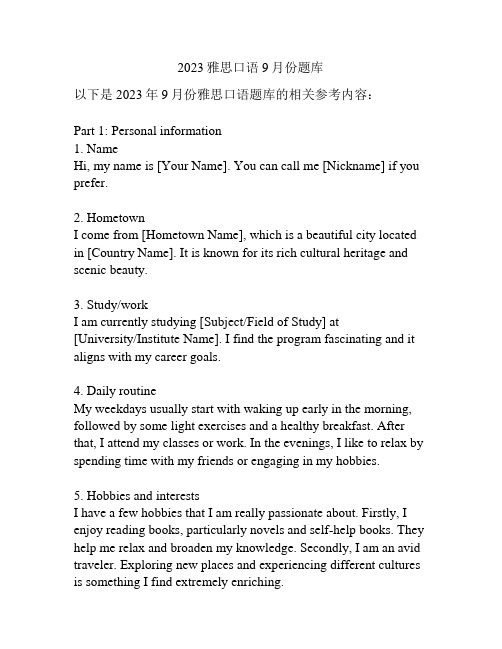
2023雅思口语9月份题库以下是2023年9月份雅思口语题库的相关参考内容:Part 1: Personal information1. NameHi, my name is [Your Name]. You can call me [Nickname] if you prefer.2. HometownI come from [Hometown Name], which is a beautiful city located in [Country Name]. It is known for its rich cultural heritage and scenic beauty.3. Study/workI am currently studying [Subject/Field of Study] at[University/Institute Name]. I find the program fascinating and it aligns with my career goals.4. Daily routineMy weekdays usually start with waking up early in the morning, followed by some light exercises and a healthy breakfast. After that, I attend my classes or work. In the evenings, I like to relax by spending time with my friends or engaging in my hobbies.5. Hobbies and interestsI have a few hobbies that I am really passionate about. Firstly, I enjoy reading books, particularly novels and self-help books. They help me relax and broaden my knowledge. Secondly, I am an avid traveler. Exploring new places and experiencing different cultures is something I find extremely enriching.6. FamilyI come from a small family consisting of my parents and a sibling. My parents have always been supportive of my dreams and have played a major role in shaping my personality.Part 2: Describe a placeDescribe a place that you have visited recently. Please say:- Where is it?- Why did you visit it?- What did you do there?- How did you feel about the visit?Recently, I had the opportunity to visit the breathtaking city of Paris in France. The main reason for my visit was to explore its rich historical heritage and iconic landmarks.During my stay in Paris, I visited famous attractions like the Eiffel Tower, Louvre Museum, and Notre-Dame Cathedral. I spent hours wandering through the streets of Montmartre and soaked in the artistic vibes of the city. I also indulged in delicious French cuisine and tried out some local delicacies.The visit to Paris left me mesmerized. The architectural beauty of the city, combined with its vibrant art and culture, made it an unforgettable experience. I was captivated by the history and grandeur of the landmarks and museums. The French people were warm and friendly, making the trip even more enjoyable.Part 3: Tourism1. Benefits of tourismTourism brings numerous benefits to both the tourists and the local communities. Firstly, it boosts the economy by generating employment and increasing revenue. Secondly, it promotes cultural exchange and understanding, as tourists get to experience different traditions and customs. Lastly, it helps in preserving and conserving natural and cultural heritage, as tourism often leads to the maintenance of historical sites and environmental protection. 2. Challenges of sustainable tourismSustainable tourism is crucial for the long-term preservation of destinations. However, there are several challenges. Firstly, the impact of mass tourism on the environment can be detrimental, leading to pollution and excessive resource consumption. Secondly, overtourism can strain the infrastructure and resources of popular destinations. Thirdly, striking a balance between the needs of the tourists and the local communities can be challenging, as cultural values and practices may clash with the expectations of the visitors. Overall, tourism has tremendous potential if managed responsibly. It can bring economic benefits, foster cultural understanding, and contribute to the conservation of natural and cultural heritage. However, it is important to address the environmental and social challenges associated with tourism to ensure its sustainability.。
剑9-Test3-Reading-passage-3解析PPT课件
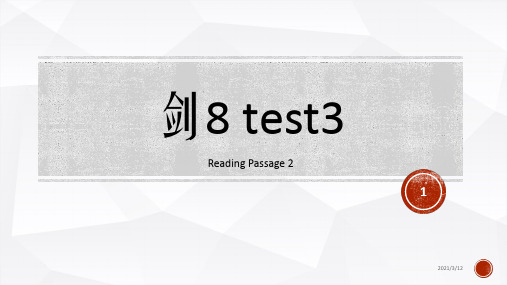
2021/3/12
4
q15
▪ 题目解析 ▪ 题干中说的是一种把生产在某处的能源带回英国的方式,很明显能对应到E段。 ▪ 答案句:Dr Bahaj has done most work on the Alderney site, where there are powerful
currents. The single undersea turbine farm would produce far more power than needed... and be re-imported into Britain via the cable under the Channel.(整个E段) ▪ 定位词:back ▪ 答案:E
▪ 题目解析 ▪ 我们需要抓住题干中的location和first ▪ 答案句:The first station is expected to be installed off Lynmouth in Devon shortly to test the
technology in a venture jointly funded by the department of Trade and Industry and the European Union.(C段第二句) ▪ 定位词:location,first ▪ 答案:C
2021/3/12
2
生词
▪ turbine ▪ blade ▪ propeller ▪ drastically ▪ self-sufficient ▪ coal ▪ ailing ▪ subsidiary ▪ indented ▪ cable
n.涡轮 n. 叶片,刀片 n. 螺旋桨生病的 n. 子公司 adj. 犬牙交错的 n. 缆绳;电缆
- 1、下载文档前请自行甄别文档内容的完整性,平台不提供额外的编辑、内容补充、找答案等附加服务。
- 2、"仅部分预览"的文档,不可在线预览部分如存在完整性等问题,可反馈申请退款(可完整预览的文档不适用该条件!)。
- 3、如文档侵犯您的权益,请联系客服反馈,我们会尽快为您处理(人工客服工作时间:9:00-18:30)。
剑桥雅思9口语真题+解析Test3-Part3摘要:剑桥雅思9口语真题+解析Test3-Part3,剑桥雅思9Test3口语Part3讨论话题举例:Reasons for daily travel,有需要的同学抓紧时间下载吧!Discussion topics:Reasons for daily travelExample questions:· Why do people need to travel every day?为什么人们每天都需要出行?笨鸟雅思口语名师点题本题询问人们为什么每天穿梭于各地。
通常针对询问people的问题,可以相应列举出不同人群,如上班的人、上学的人、走亲访友的人、旅游的人等,同时针对某类人群适当进行拓展。
高分示例People need to travel for lots of different reasons. Almost everybody has to travel to work, so they can earn money and provide for their families. If a person is lucky, then they will live very close to the place where they work, so they can travel on foot or by bicycle. Sometimes, however, people live very far away, so they must travel by bus, train, car, or even sometimes by plane or boat! Lots of people also travel to see friends and family members, who might live in a different city, or even a different country. But often people just like to travel for fun, to go to somewhere new, or to see a famous tourist site or place of natural beauty.参考译文人们有各种各样的理由来来往往。
几乎每个人都要去上班,这样才能赚钱养家。
幸运的人住的地方离工作单位很近,可以步行或者骑车去上班。
但是,有时候,住的地方比较远的人就必须坐公交车、坐火车、开车,甚至坐飞机、坐船去上班。
大部分人都会去异地甚至异国拜访朋友、看望家人。
但是人们经常是出去玩,去探索新的地方,去看看著名的景点,去看看自然美景。
亮点表达earn money 赚钱tourist site 旅游景点provide for 供养· What problems can people have when they are on their daily journey, for example to work or school? Why is this?人们在每天的上班或上学的途中会遇到什么问题?为什么?笨鸟雅思口语名师点题回答这个问题可以从日常生活的角度出发,如天气问题、交通问题等,也可以从更深层次的角度出发,如空气污染问题等。
无论选择哪一种话题,只要合情合理即可。
高分示例When people are on their daily travels, there's always the possibility of meeting traffic jams. This will cause people to be late for school or work. This phenomenon has been down to the increasing cars. It is a real challenge in a city with so many people and cars. To solve this problem, governments are encouraging people to use public transport or walk. All these are to raise environmental awareness and reduce congestion.参考译文人们在每天的出行途中,总是有可能遇到交通拥堵问题。
这会导致人们上学或上班迟到。
这一现象的出现是由于汽车的数量在持续增加。
改善交通问题对于人多车多的城市来说真是一个挑战。
为解决这个问题,政府鼓励人们多使用公共交通工具或步行。
所有这些都是为了提高人们的环保意识并减少拥堵。
亮点表达traffic jam 交通堵塞environmental awareness 环保意识public transport 公共交通congestion n.堵塞,拥挤· Some people say that daily journeys like these will not be so common in the future. Do you agree or disagree? Why?有些人认为这样的日常出行在将来会变得不这么频繁。
你同意还是不同意,为什么?笨鸟雅思口语名师点题这是一个比较开放性的问题,需要考生发散思维去想象。
答案可以涉及新的出行方式或者新的办公和生活方式等。
高分示例I agree that in the future, people's daily journeys will be reduced. In recent years, accompanied by the wide spread of network, people are spending more time working and playing at home. More and more people are telecommuting one or more days a week as opposed to going to office every day. In addition, shopping online also saves people the trips to the stores.参考译文我同意,以后人们的日常出行将会减少。
近几年,随着网络普及程度的提高,人们在家办公或娱乐的时间在逐渐增多。
与以前每天去办公室上班不同,越来越多的人每周一天或几天在家远程办公。
另外,网上购物省去了人们去商店的路程。
亮点表达telecommute v.远程办公shopping online 网上购物as opposed to 与……截然相反Benefits of international travel Example questions:Example questions:· What do you think people can !earn from travelling to other countries? Why?你认为人们能从异国旅行中学到什么?为什么?笨鸟雅思口语名师点题说到“异国旅行”,人们通常很容易联系到不同的文化、语言、饮食等,考生可以从这些方面入手。
如果泛泛而谈不易切入话题的话,也可以尝试以自身的经历为例来讲述,同时可以采用对比的方式。
高分示例I have travelled to many countries all over the world, such as Europe, Africa, North America and Asia. I think travelling has helped me to become a more humorous, knowledgeable and well-rounded individual with a greater understanding and acceptance for world cultures. Moreover, I also learnt to know much about other cultures' languages, beliefs, history, food and drink. Many of my friends have never left their hometowns, and this shows in their ways of thinking, which is often limited and very conservative.参考译文我去过全世界很多个国家旅行,欧洲、非洲、北美洲和亚洲。
我觉得旅行能让我变得更风趣、见多识广,对世界各地的文化都有了更深的理解与认同。
而且,我还对异域的语言、信仰、历史和饮食等都有所了解。
我的很多朋友从来都没有离开过自己的家乡,他们的思维方式会有所受限,很保守。
亮点表达well-rounded adj.全面的;面面俱到的way of thinking 思维方式· Can travel make a positive difference to the economy of a country? How?旅行能给一个国家的经济带来积极的影响吗?怎样影响?笨鸟雅思口语名师点题针对本题,考生需要思考的是:游客在旅游过程中通过哪些方式给另一个国家的经济带来影响。
比较容易着手的点是饮食、住宿、购物等方面。
如果不容易切入话题的话,也可以以自身的经历为例来讲述。
高分示例I have been to over 25 countries worldwide. Often, this has been a quick trip or tour of a country, where I can see and do as much as I can in the time period that I have. But I have also lived in two foreign countries: Uganda, where I lived for 4 months, and England, where I have been for over a year. In both situations, 1 feel I have contributed to the economy of the respective countries. When I was travelling, I spent much money on gifts, food and accommodation, and when I was living abroad I also paid taxes and offered my skills to the country in the form of work.参考译文我曾去过25个国家。
